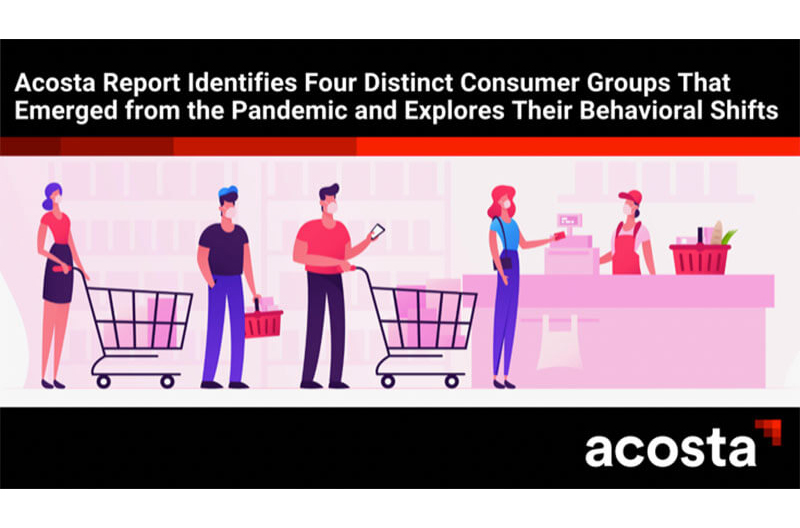It has been more than a year since COVID-19 restrictions were put into place in the U.S., and consumer shopping habits have changed dramatically. In COVID Consumer Journey: Passive to Panic, a new report from Jacksonville, Florida-based Acosta, an integrated sales and marketing provider in the consumer-packaged goods (CPG) industry, breaks down changes in shopping behaviors among four distinct consumer groups that emerged as a result of the pandemic.
The new consumer groups identified by Acosta include: “Staying the Course,” skewing toward younger, employed males; “Social Distancers,” skewing toward employed Millennials and/or Millennials with children; “Hunkering Down,” leaning toward older and retired or unemployed individuals; and “Panic Button,” more likely to be Gen-Xers with children or older individuals with no children.
“While we’ve seen significant growth in the number of consumers stocking up, shopping less and buying more online, our research indicates COVID concern level directly corresponds with changing shopping habits,” said Colin Stewart, EVP of business intelligence at Acosta. “In fact, 94 percent of the individuals in our ‘Panic Button’ segment, which reported the highest COVID concern level of 8.6 out of 10, stocked up on groceries, while only 30 percent in the ‘Hunkering Down’ segment, with a lesser concern level of 7.4, did so. Similarly, 63 percent of the ‘Panic Button’ segment shopped more online during the pandemic, while only 25 percent of the ‘Social Distancers,’ with a concern level of 7.7, changed this behavior.”
COVID Consumer Journey: Passive to Panic provides a comprehensive analysis of the difference in shopping behaviors between the four consumer groups that emerged as a result of the pandemic, including:
Shopping Behavior Changes by Segment
- The “Panic Button” segment, comprising 21 percent of shoppers, has high COVID concern and made significant and swift changes, like stocking up and shopping online;
- The “Hunkering Down” segment, comprising 28 percent of shoppers, made moderate changes, including shopping less and spending less;
- The “Social Distancers” segment, comprising 28 percent of shoppers, made only small changes, like buying more groceries than usual; and
- The “Staying the Course” segment, comprising 23 percent of shoppers, made no real changes to their shopping habits and had less overall COVID concern.
Post-COVID Shopping Habits
- Post-pandemic, many shoppers will continue with the new habits they’ve developed, particularly those who have changed the most.
- Shoppers in the “Panic Button” segment are most likely to stick with their new habits. Eighty-two percent plan to continue with at least some changed habits, and 27 percent plan to stick to all or most of their changed habits; and
- “Social Distancers” are most likely to revert to their pre-pandemic shopping behaviors, with 29 percent planning to do so, compared to 19 percent of “Hunkering Down” shoppers and 17 percent of “Panic Button” shoppers.
Post-COVID Shopping Priorities
Looking at shoppers as a whole, product availability will be the top priority (60 percent), followed by lower prices (52 percent) and customer safety (42 percent). While these remain most important to all shoppers, priorities will vary by the four segments:
- Convenience, lower prices and good customer service will be even more important for “Staying the Course” shoppers;
- Customer safety and fast checkout will be more important to the “Social Distancers” segment;
- Promotions, lower prices and the option for delivery will be higher priorities for “Hunkering Down” shoppers; and
- Product availability, customer safety and options for curbside pickup and delivery will be higher priorities for “Panic Button” shoppers.
Acosta’s COVID Consumer Journey: Passive to Panic report was gathered via online surveys using the company’s proprietary shopper community, conducted between Dec. 30, 2020 and Jan. 4, 2021. To access the full report, visit acosta.com.

